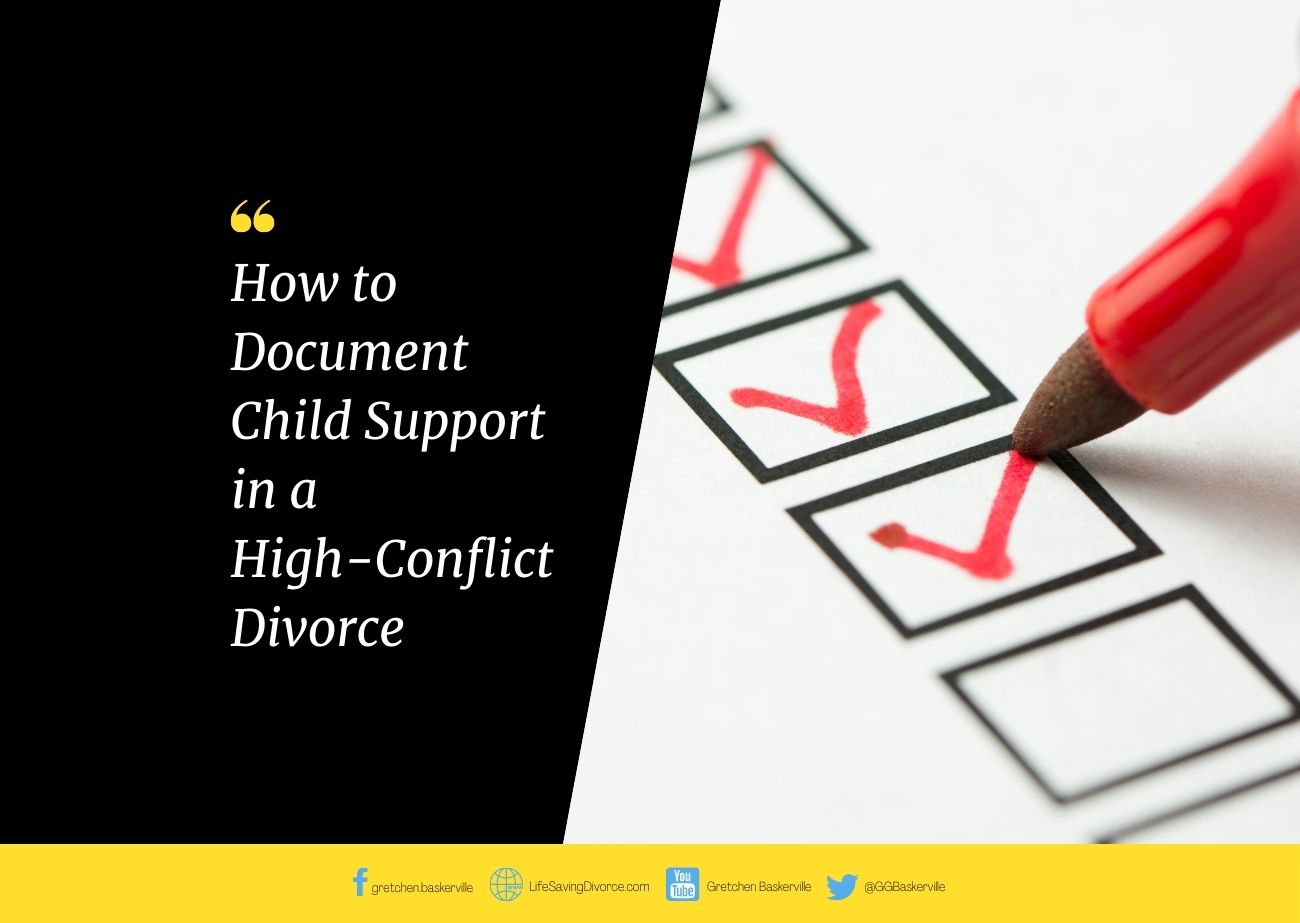How to Document Child Support and Expenses
and Protect Yourself in Divorce or Separation
Fewer than half of ex-spouses who are required to pay child support actually do pay it in full. In difficult divorces where one parent may not play fair or follow the divorce agreement, it is important to document everything, starting right away. This article gives examples of 12 financial issues to document and a free worksheet to keep track of support payments, medical expenses, and childcare expenses.
What Should You Document? When?
Start documenting immediately. The main goal of documenting is to be able to “paint a picture” for the legal authorities over the case. It needs to illuminate the pattern of behaviors without calling it by name.
Using a co-parenting app on your computer, tablet or smartphone will help you to avoid the “he said/she said” problem. You communicate with the other parent only through the app. The apps make it very difficult for people to change dates, wording and pretend they did or didn’t open or respond to an email. Some apps can help you maintain a business-like tone by suggesting alternative wording. Often the court requires the divorcing parties to split the cost of these apps, but that’s okay, because some have a free option. Last I checked: OurFamilyWizard is about $12 per month. AppClose has no subscription or monthly fee. TalkingParents is free for their most basic service. Ask the Court to mandate that the two parents communicate only through the app.
12 Financial Issues to Document for Your Divorce
There are many simple financial apps and/or co-parenting apps for tracking childcare expenses and tracking the date and amount of the child and spousal support payments you pay or receive. In order to understand what the court requires, read your divorce judgment to review the deadlines and requirements.
- Missed child support payment, late payment, or reduced payment. Know what dates and amounts your judgment requires. Write down date and amount expected, and date and amount received.
- Reason the payment was not made or received.
- Be prepared to give a report to your attorney of how much you paid and how much you are owed: in child support, spousal support, childcare expenses (clothing, daycare costs, unreimbursed medical, child counseling), and home repairs (if you are both responsible for the home), and other expenses (medical and life insurance premiums, for example).
- Your ex is a grown-up and has a copy of the judgment and they are required to follow the support agreement, not relying on reminders or demands from you. However…
- It may help your case to send a regular written (emailed) reminder that your ex is in arrears. “According to my records, child support payments are behind by $_____. Please come current.”
- If your spouse does not pay, you may want to contact your attorney or the court. The court may require you to fill out an application to determine arrearages. In some counties, you can contact the DA’s office (the district attorney).
- If you agreed to split the cost of unreimbursed medical costs for your children, let the other parent know the amount as soon as you know or as soon as you receive the explanation of benefits from the insurance company.
- If your agreement includes a requirement to split the cost of home repairs, keep receipts for those repairs, and send a photo or PDF copy to them as soon as possible.
- Larger home repairs may have to be agreed upon in writing in advance. Send via email or co-parenting app a photo of the problem and 2-3 repair estimates from a qualified person to your spouse in advance.
- Document evidence that your spouse has more money than they claim. Do this if your spouse is behind in support payments yet seems to be able to buy new vehicles or expensive items, travel for leisure, or participate in expensive sports.
- Document any promises your ex makes to pay for half or reimburse you, yet doesn’t follow through. Having this is writing is helpful.
Download FREE: Worksheet for documenting child support, spousal support, unreimbursed childcare or medical.
From a mother who says a co-parenting app helped protect her in court from her ex’s false allegations.
“I document EVERYTHING. My divorce is final but I still have to coparent with my ex. Only about 5% I’ve actually used in court to counteract my ex’s false allegations but I can’t tell you what a blessing that was!
I use AppClose for communications with my ex about coparenting and save individual “topical” conversations about important issues and also export the entire month of conversations and save them to a secure back up space online.
AppClose now offers a GPS check-in feature for drop off and pick ups so there’s absolutely so question about the times of arrival. I document and export all of these too which saved me in the court room when my ex falsely accused me of always running late when in fact many times I was 5-10 mins early. (Editor’s note: Other apps also have GPS check-ins.)
I use an app called Alimentor 2 which documents custody notes, all parenting time. You can enter the custody schedule and then the actual parenting time spent, cancelled visitations, phone calls, finances, and more. You can then export a PDF report which is accept in most court rooms which will show overnights spent with each parent as well as the custody notes and percentage of time spent with each child. 100% worth the time investment to document!”
12 Incidents to Document for Your Divorce
These are examples of the types of incidents you may want to document.
- Threats against you. “If you divorce, I’ll get custody of our daughter.” “You’ll never get a dime from me.” “I’ll destroy you in court.” “I’ll ruin you.”
- Anger about the divorce. Trying to stop or delay the divorce: Not responding to letters, changing addresses without telling you so they can’t be served, calling your friends/family and telling them he (or she) wants to save the marriage and suggesting they pressure you.
- Vitriol or hate mail. Calling you names, trying to ruin your reputation, accusing you of sleeping with everyone, accusing you of doing the very things they are doing. Saying, “if you were any kind of parent, you’d do this…” Or “you’re an awful parent, your child is better off without you.”
- Stalking behavior. Driving by your house, standing outside your workplace, calling your boss, trying to get you fired, creating a crisis so you have to leave work early, bothering your coworkers. (Get coworkers’ statements in writing right away. Save their emails/texts and print them out. If you let time pass, they may not want to get involved.)
- Not following court orders about visitation. Coming too early, coming more than 15 minutes late, not showing up at the scheduled time and place, picking kids up at school early and demanding the teacher let the kids out.
- Hacking your phone or computer. (This is why it may not be best to document everything on your phone. Hacking is also illegal.)
- False allegations with no proof. (Your attorney will ask them in court if they have proof. But it also helps to use a co-parenting app that documents your conversations and gives GPS location and time/date stamps to provide evidence about custody exchanges. See more below.)
- Withholding child support. This is especially to be noted if your ex is also demanding you pay to get kids into expensive sports/lessons.
- Financial abuse. Taking money out of joint accounts, refusing to pay support in a timely fashion (yet demanding you pay for the kids’ camp, sports, or activities by the deadline).
- Constant litigation. Note this especially if it is happening over small things, such as not making a phone call at exactly 5:00 pm.
- Disparaging comments. These can be about your family, your sex life, accusing you of having sex partners coming in and out of your house (which, incidentally, proves they are stalking you).
- Claiming that something is true when it’s not. Denying something that turns out to be true. Saying the kids finished and turned in their report, claiming they had spent a certain amount of money on the kids’ sports uniforms, claiming they gave you items that belonged to you.
- Not picking up or dropping off the kids within 15 minutes of the specified court-approved time. Not dropping them off at the agreed upon location. Cancelling visitation or vacation plans without reasonable notice.
- Demanding leniency from you, but refusing the same leniency when you request it.
- Setting appointments and standing you up. For example, if your ex insists on having a contractor come look at the house and sets a date and asks you to block out time, yet fails to show up and fails to cancel in advance.
From a mother who’s been through it:
Start documenting now. Don’t just delete those hate-filled accusations, the name calling, and the threats. You’ll need them as evidence later. It will not get better. It will get worse. You may be hoping it will settle down and they get involved with a new romance, but don’t let your guard down. But the Lord is with you. Just keep being the best parent you can be.
From a father who’s been through it:
“My advice is usually for the women, because they have it so much worse than I did. Think of your kids. Custody is an issue. That’s why I stayed. I was afraid that I would lose my kids, and that was her first counter to me filing for divorce. She said, “You know, you’re gonna lose all parental rights,” and my attorney said, “No way. This guy has been a schoolteacher for 20 years. He’s loved. He has a tight relationship with his kids. There’s no way in hell that his kids should be totally taken away from him.” And she had to bring that up once, and it was never mentioned again. Take care of your kids. Don’t fear that a broken home is going to break your kids. Because keeping your kids in an abusive relationship will break them more.”
It’s normal for the divorce process and recovery to take time, and your best bet is keeping the kids out of the gory details, validating their feelings and process, getting your emotional needs met by other adults rather than expecting your kids to do that for you, and calmly and continually modelling and requesting kind, respectful treatment from each member of the family to all the others-including you!
A Final Word of Comfort
Though you may feel you’re walking a lonely path, there are others who’ve been where you are.
Though the waters may be rough at first, there are calmer seas ahead. Get support for yourself, and maintain protective boundaries for your children as best you can; many kids, as they grow up, come to see the truth about how dangerous the marriage was.
Nearly everyone I interviewed for this book wanted readers to know that they are grateful for their divorce and are doing better. Many started this path feeling confused, discouraged, and fearful. They felt they would never survive.
But they did-with God’s help.
They talked about the peace they’ve found and freedom from being trapped in an unworkable situation.
Even those who are in tough court battles are glad they made the decision to leave. They no longer have to live with their ex-spouse 24 hours a day, and it makes a positive difference in their children’s lives.
God cares about you, and about your children, as you are going through a life-saving divorce, and you can cling to his promises of love and his presence with you every step of the way.
As a father shows compassion to his children,
so the Lord shows compassion to those who fear him.
-Psalm 103:13 (ESV)
For I know the plans I have for you, declares the Lord, plans for welfare and not for evil, to give you a future and a hope.
-Jeremiah 29:11 (ESV)For more books, free videos, and support groups on the topic of high-conflict divorces and/or parental alienation, see Section 10 in my recommended books list.
- Are you going through a life-saving divorce and need support and clarity? I’d like to invite you to my private Facebook group, “Life-Saving Divorce for Separated or Divorced Christians.” Just click the link and ANSWER the 4 QUESTIONS. This is a group for women and men of faith who have walked this path, or are considering it. Supporters and people helpers are also welcome. I’ve written a book on divorce for Christians and other people of faith, The Life-Saving Divorce: Paperback: https://amzn.to/3cF1j25 Or eBook: https://amzn.to/3CCBsnrAlso, sign up for my email list below or HERE www.lifesavingdivorce.com/courage
MOST POPULAR BLOG POSTS
Start Here
- What is a Life-Saving Divorce? How Do We Know Half of Divorces in the U.S. Sre “Life-Saving”? (or watch the video)
- Life-Saving Divorce: Introduction What Is this Book About? (audio and transcript)
- About Me: Why Is a Nice Christian Girl Like Me Promoting Divorce?
- How Can I Get the Book, The Life-Saving Divorce? (Amazon affiliate link.) – FREE study guides for each chapter. – FREE videos for each chapter.
Does God Hate Divorce? God Gave Divorce Due to Hardhearted Abusers & Betrayers
- Myth: Divorce is the Unpardonable Sin and “God Hates Divorce”
- Abuse is Biblical Grounds for Divorce
- Malachi 2:16 Haven’t Our English Bibles Always Said, “God hates divorce”? No.
- “But He Never Hit Me”: Divorce for Neglect, Emotional, and Financial Abuse
Physical and Emotional Abuse & Infidelity- 130 Examples of Abuse: Emotional, Physical, Financial, Spiritual and Gaslighting
- Pastors Who Accept Physical and Emotional Abuse as Grounds for Divorce
- Severe Emotional Neglect: Toni’s Story of Finding Freedom (video)
- 40 Years of Murderous Rages and How I Got Free! Karen’s story (video)
- How Churches Should Handle Abuse Victims (video with Pastor Neil Schori)
- Help! I’m Married to a Cheater: Should I Stay or Go?
- Married to a Pedophile: How I Got Out – Pam’s Story (video)
- Help! I Am Alone with the Abuser
God Allows Divorce to Protect Victims
- Jesus’ Greatest Divorce Sermon – Luke 13 (or watch the Video)
- Pastors Who Accept Physical and Emotional Abuse as Grounds for Divorce
- Myth: The Person Who Files for Divorce Caused the Divorce
- Haven’t Our English Bibles Always Said, “God hates divorce”? No.
- Jesus Said, “Love My Enemy”-Can I Still Divorce Them?
- But I Thought it Was God’s Will for Me to Marry this Person!
- Is Pointing Out Marriage-Endangering Sin Being Judgmental? (video)
- One Woman’s Story: Adultery, Prayer and the Bible
- Is Marriage an Unconditional Covenant or a Conditional One? (Video)
- Does Divorce Shatter the Image of Christ and the Church as John Piper Suggests?
- Divorce and the Good Samaritan Story
- Myth: Divorce is the Unpardonable Sin and “God Hates Divorce”
- Myth: Your Divorce Will Shatter the Image of Christ and the Church
- Myth: You Must Forgive and Forget Over and Over, Forever
How to Find a Good Supportive Church- Pastors Who Accept Physical and Emotional Abuse as Grounds for Divorce
- 7 Ways to Know if a Church is Safe for Abused Wives (or Abused Husbands)
- Do My Pastors Have a Say about Me Getting a Divorce?
- Good vs. Bad Pastoral Counselors on the Topic of Marital Abuse: 40 People Tell their Stories
What If My Pastor Says It Would Be Wrong to Get Divorced for Abuse?
- 5 Bible Verses that Say You Should Separate from an Abuser
- 1 Million God-honoring Divorcees Cannot Find a Good Church
- Church Denominations and Divorce Policies Comparison Chart
- Excommunication for Getting Divorced? What to Do!
- Evangelicals Shooting their Own Wounded Divorcees (video) or blog/transcript
- How to Handle Criticism When You Divorce (video-3 parts) Natalie Hoffman, Gina Kaye
- Myth: You Don’t Take God-Ordained Marriage Seriously
- Sermon Ideas for Domestic Violence Awareness Month – October
- Churches That Block Abused Wives (and Husbands) From Divorcing
- Southern Baptists make Evangelicalism Unsafe for Abused Wives & Husbands
- How Churches Should Handle Abuse Victims (video with Pastor Neil Schori)
- List of Every Known Puritan Divorce in Massachusetts between 1639 and 1692.
Divorce Saves Lives: The Surprising (Wonderful!) Truth About Divorce Nobody Told You
- Your Kids Will Likely Be Fine After Divorce (Nearly 8 in 10 Are!)
- 10 Facts Evangelical Pastors MUST Know about Kids and Divorce [VIDEO]
- There Is No Divorce Crisis. We have a Sin Crisis.
- Myth: 95% of Divorces are for Falling Out of Love
Will I Ever Find Love Again? Dating After Divorce: Good News
- Will I Ever Find Love Again?
- Dating after Divorce: An interview with Gina Kaye
- I Fear I’ll Never Find a Healthy Relationship
- Remarriage after Divorce: How Can I Claim to be the Innocent Spouse? I Had My Faults Too!
Finding Happiness and Health After Divorce
- Will the Kids and I Ever Be Happy Again?
- Happiness Either Way: Remarriage or Staying Single
- Divorce May Improve Your Health: Depression, Suicidal Thoughts and Medical Issues
- How My Health Improved Dramatically After Divorce: Karen’s Story (video)
- “I’m Off of All My Depression Medications Now That I’ve Divorced” Schari’s story (video)
- PTSD, EMDR and My Major Health Improvements after Divorce Toni’s story (video)
Thriving After Divorce: These Christians Tell their Stories
- Christians Finding Peace after Divorce: Shirley Fessel, Author (Audio) or (Video)
- 10 Turning Points: Stories of How Others Decided to Stay or to Go
- Married to a Pedophile: How My Kids and I Got Free! (video)
- Finding Joy after a 40-Year Abusive Marriage (video)
- Can I Divorce My Mentally Ill, Destructive Spouse? Yes! Amanda’s Story (video)
- From Bondage to Glorifying God! 5 Survivor Stories (after 20-, 30-, 40-year long abusive marriages)
Self-Doubt, Second-Guessing Ourselves, and Gaslighting- Am I the One Destroying the Relationship?
- How Can I Call Myself the Innocent Spouse? I Wasn’t Perfect Either (video)
- Is Pointing Out Marriage-Endangering Sin Being Judgmental? (video)
- Myth: He Wouldn’t Cheat or Watch Porn if You Gave Him More Sex
- Myth: You’re Lying: We’d All Know If Your Spouse Was That Bad
- Myth: It Takes “Two to Tango” and “All Marriage Problems are 50/50”
- How to Handle Criticism When You Divorce (video-3 parts) Natalie Hoffman, Gina Kaye
Children and Divorce: Researchers Give Hope
- Is it Best to “Stay for the Kids”? Sometimes, yes. But Not if It’s a Toxic Marriage
- Bad Fathers Are Bad for Kids, Canceling Out the Benefits of a Two-Parent Married Home
- Researchers Know Your Kids Will Likely Be Fine After Life-Saving Divorce
- 5 Studies That Say Your Kids are Likely to Be Okay After Divorce (video)
- Marriage Does Not Guarantee Good Kids: 1 in 10 Kids from Married Two-Parent Homes are Troubled.
- Myth 21: Divorce will Destroy Your Children, So Stay for the Sake of Your Kids
High Conflict Divorce and Parenting
- Research shows: Your Kids Will Likely Be Fine After Divorce: In Fact It’s Best to Divorce to Get Away From Abuse
- 12 Ways to Document and Protect Yourself in a High-Conflict Divorce
- 12 Tips for Talking with Angry, Alienated Kids
- Myth: Divorce will Destroy Your Children, So Stay for the Sake of Your Kids
Recommended Reading List and Free Resources for Christians and Other People of Faith
Common Myths
- Myth: Your Marriage Would Be Great if You Just Submitted More
- Myth: Divorce will Destroy Your Children, So Stay for the Sake of Your Kids
- Myth: Divorce is the Unpardonable Sin and “God Hates Divorce”
- Myth: You Just Didn’t Try Hard Enough
- Myth: You Don’t Take God-Ordained Marriage Seriously
- Myth: Your Divorce Will Shatter the Image of Christ and the Church
- Myth: You Must Forgive and Forget Over and Over, Forever
- Myth: 95% of Divorces are for Falling Out of Love
- 27 Myths about Divorce That Probably Don’t Apply to Committed Christians
FREE
- Download “7 Effective Ways to End the Stigma of Divorce in the Church” (Sign up)
- Download “7 Effective Ways to Deal with Criticism when You Divorce” (Sign up)
- Download “3 Studies that Show Kids Are Most Likely to Turn Out Fine After Divorce” (Sign up at bottom of page)
FOLLOW
- Home Follow me on Facebook • Follow me on Twitter • Buy the book.
- 10 Key Highlights from the The Life-Saving Divorcebook: 10-minute video overview OR 10 Key highlights blog post
- Request to Join the Life-Saving Divorce Private Facebook Group (Don’t forget to answer the 4 questions)
- Subscribe (FREE) to my You Tube Channel
- About Me Contact
- Gretchen’s Life-Saving Divorce Interviews in the Media
GET THE BOOK! The Life-Saving Divorce is about divorces for very serious reasons: a pattern of sexual immorality, physical abuse, chronic emotional abuse, family-impairing addictions, abandonment, or severe neglect. This book will give you hope for your future, and optimism about your children. As an Amazon Associate I earn from qualifying purchases.




 :
:
 Buy PDF
Buy PDF